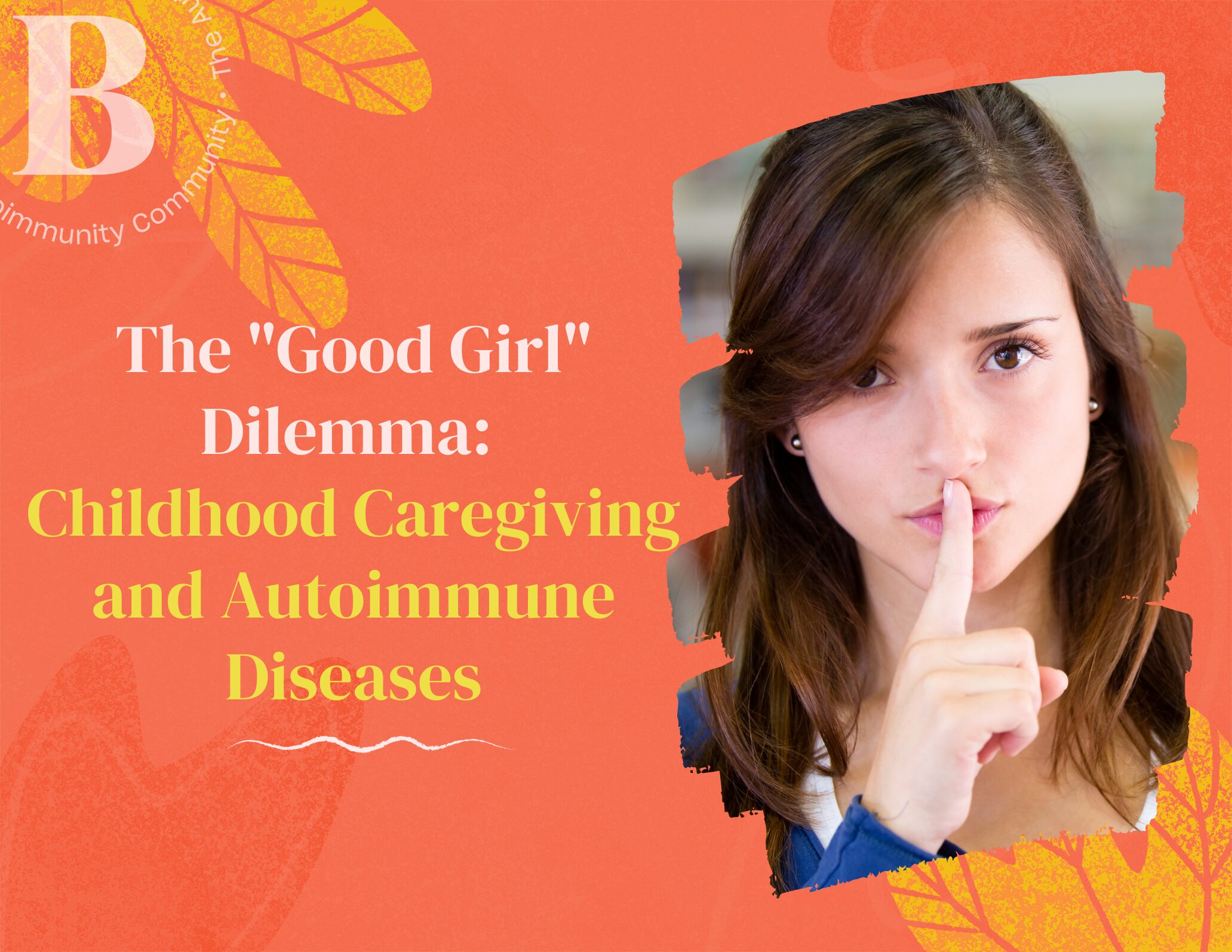
The “Good Girl” Dilemma: Childhood Caregiving and Autoimmune Diseases
Childhood caregiving roles often set the stage for a lifetime of self-sacrifice and neglect. For many women, the pressure to be a “good girl” – always putting others first – can lead to significant health issues, including autoimmune conditions.
Sara Hirsh Bordo’s groundbreaking survey, conducted by PROOF Insights on behalf of Women Rising®, sheds light on the intricate connections between these childhood roles and the challenges women face in receiving help.
This survey is a vital step in uncovering how early life experiences shape women’s health and well-being, revealing the deep-rooted patterns that contribute to the autoimmune crisis.
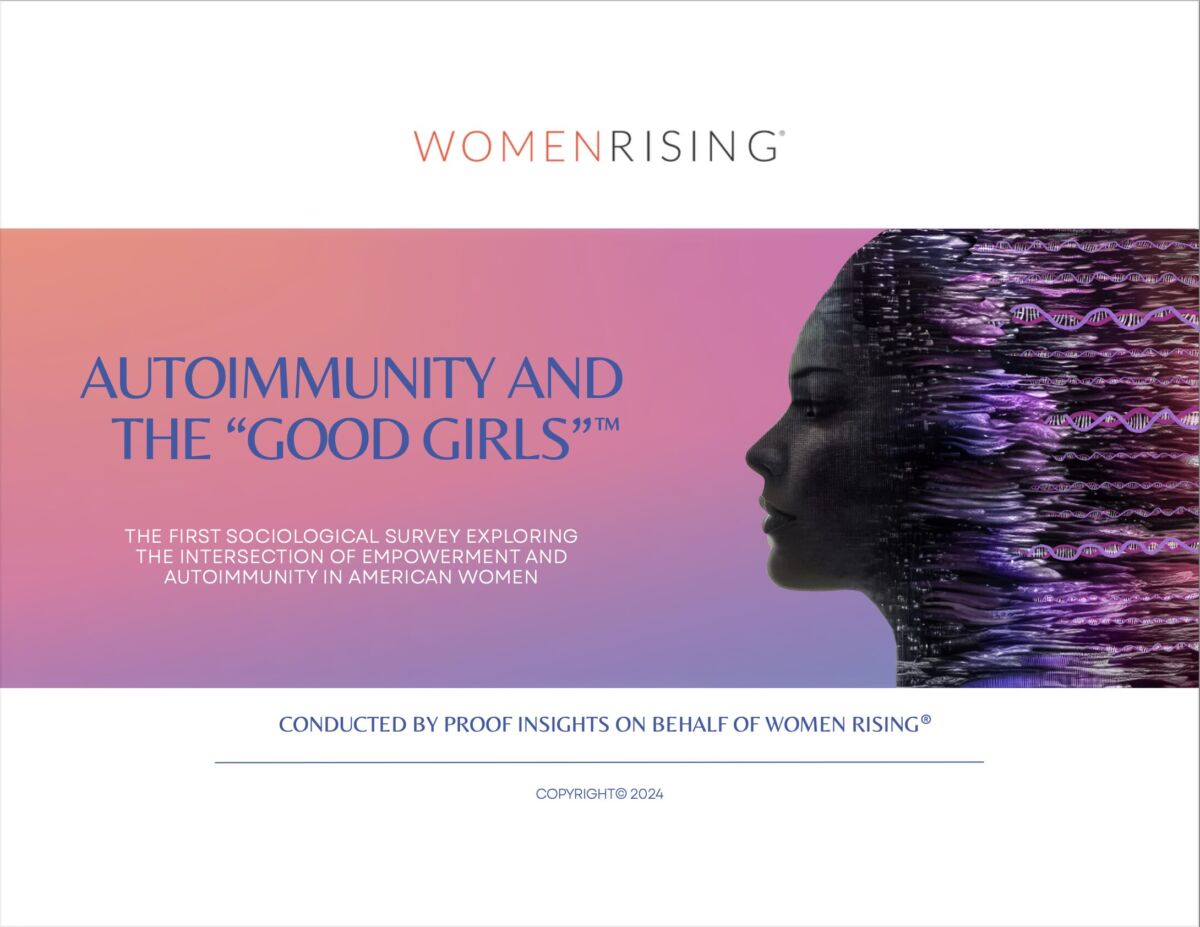
Screengrab taken from The Autoimmunity and “Good Girls”™ website
Join us as we discover the intricate relationship between autoimmunity and the “Good Girls”.
The Burden of Childhood Caregiving
Many women with autoimmune diseases reported taking on significant caregiving responsibilities during their childhoods.
According to Sara Bordo’s survey, over 60% of these women were either the oldest or only daughter in their families, roles that often came with heavy expectations to care for siblings and manage household duties from a young age.
And while caregiving, in itself, is noble and admirable, these early responsibilities can lead to chronic stress and a pattern of self-neglect, as these girls grow up believing their worth is tied to how well they can care for others.
This ingrained habit of prioritizing others’ needs over their own can have lasting impacts on their physical and emotional health.
For women with autoimmunity, the lifelong habit of always putting others first might be silently harming your health more than you realize. Have you ever considered how reclaiming some of that care for yourself could change your well-being?
Autoimmune Conditions Among Women Caretakers
Autoimmune diseases are alarmingly prevalent among women:
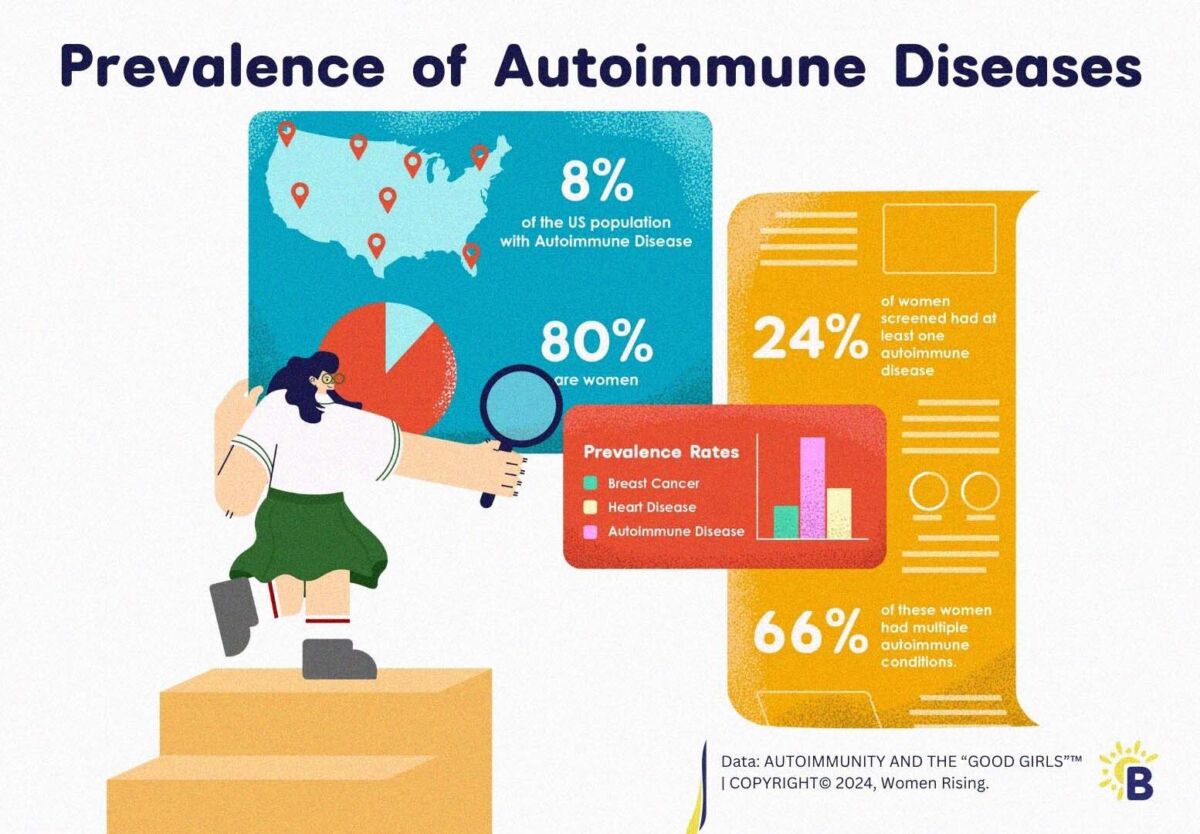
The survey highlights the significant correlation between childhood caregiving and the development of autoimmune conditions.
Over 60% of women with autoimmune conditions were the oldest or only daughters in their families, often becoming primary caretakers from a young age. These women reported feeling a strong connection between being a “good girl” and feeling loved, a sentiment that often led to chronic stress and suppressed personal needs.
As the survey notes, “Childhood experiences, such as being responsible for the well-being of siblings or even parents, can establish patterns of self-sacrifice and people-pleasing that persist into adulthood,” triggering autoimmune responses.
The “good girl” dilemma, rooted in childhood caregiving roles, significantly impacts women’s health by fostering prolonged stress and emotional repression, known triggers for autoimmune conditions.
The Difficulty of Receiving Care
Women who were early caregivers often face significant psychological barriers to receiving care as adults.
These women were conditioned to prioritize others’ needs over their own, leading to a deep-seated discomfort with accepting help.
This lifelong pattern of self-neglect and people-pleasing makes it challenging for them to recognize and voice their own needs.
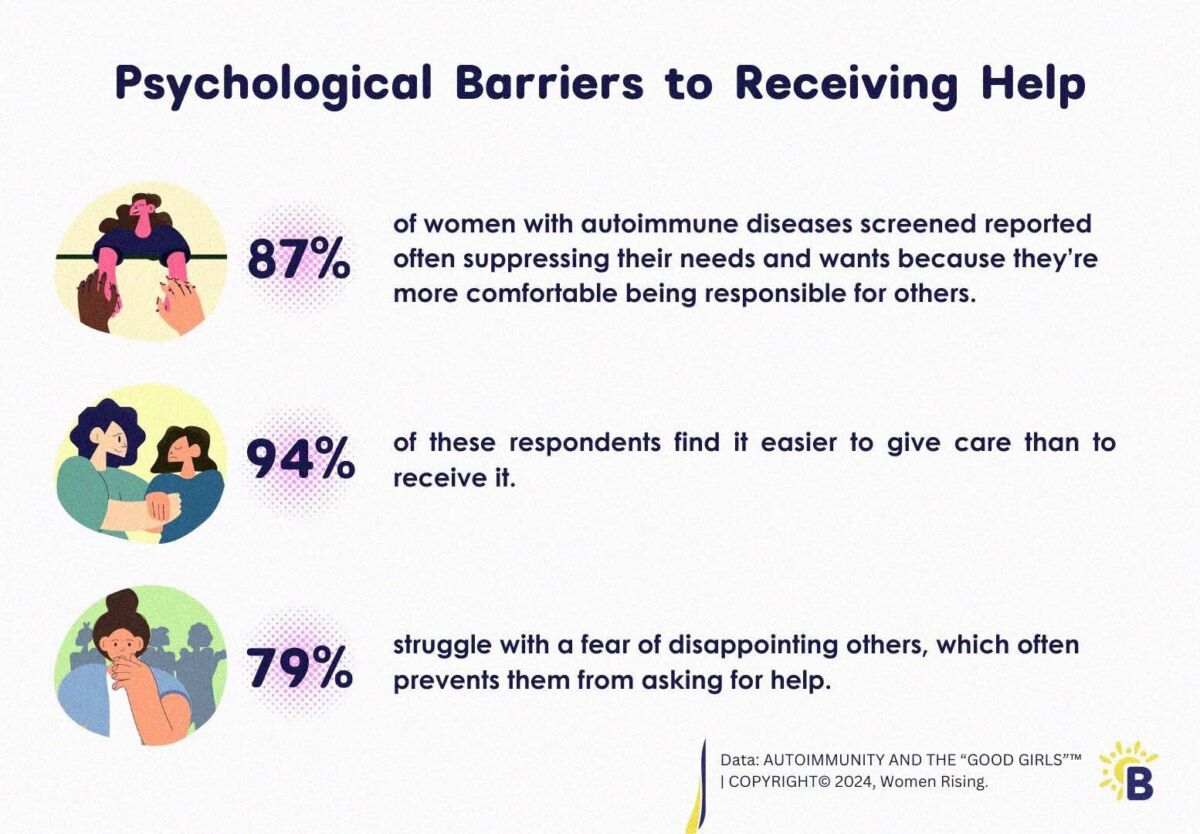
Here are some powerful anecdotes that illustrate the struggle these women face in receiving care:
- One respondent shared, “Mostly I feel guilty having others wait on me. As a wife and mother, I’m the traditional caretaker. I don’t want to burden or inconvenience others because everyone is so busy“.
- Another woman explained, “It’s hard for me to accept help from people and I’m not sure why. I think it might have something to do with the fact that I don’t want to be a burden to anyone or disliked“.
- A poignant story highlighted, “When you are repeatedly belittled for having emotions or needs, you learn to keep quiet“.
- Reflecting on her childhood, one respondent said, “My parents always said that I made them happy when I was happy. I felt that I had to maintain a good mood, good grades, and do all I was asked. When I didn’t, someone would get mad, then everyone else would be sad or mad, too. It seemed to rely on my good mood and behavior“.
These narratives underscore the profound impact that childhood caregiving roles and the “good girl” conditioning have on women’s ability to receive care.
They illustrate how deeply ingrained these behaviors are and highlight the need for supportive interventions that can help women feel more comfortable accepting help.
Social and Emotional Implications
These play a significant role in shaping the “good girl” syndrome:
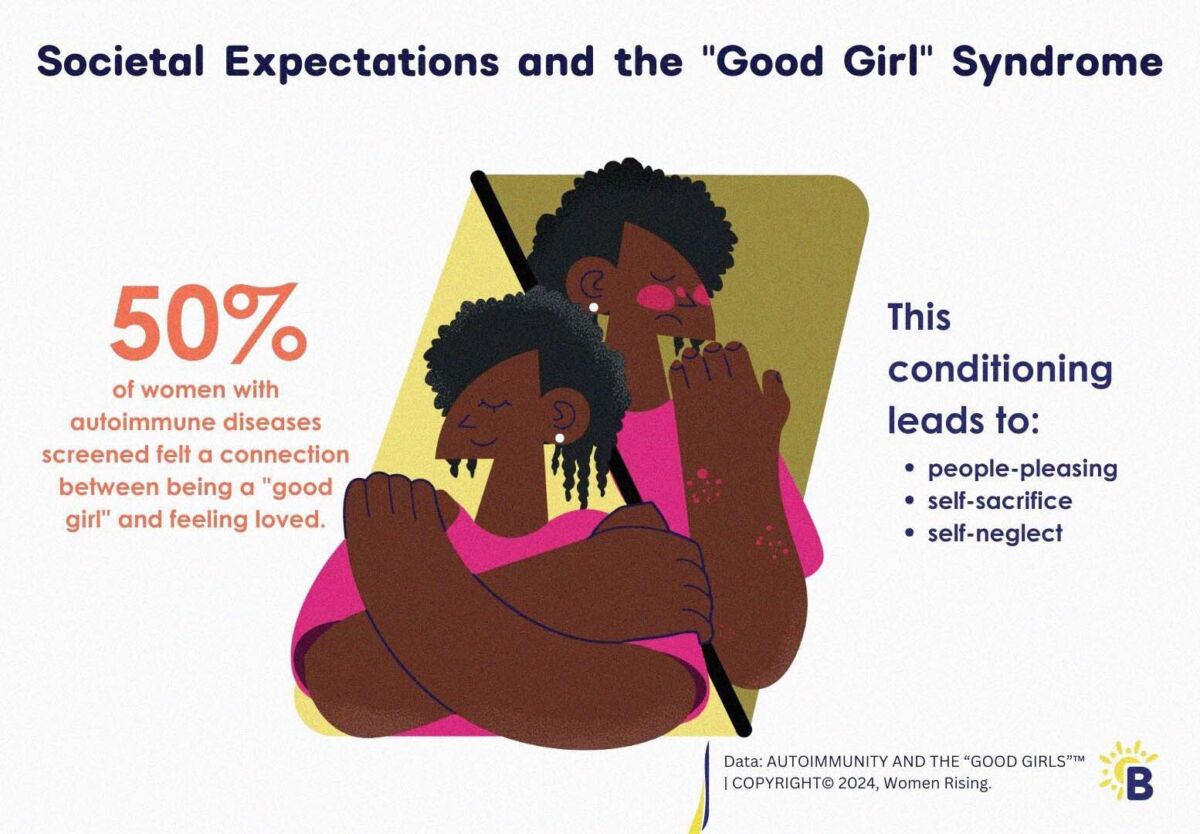
The pressure to conform to these societal expectations often means that women’s own needs are sidelined. This pervasive cultural norm fosters an environment where self-care is viewed as selfish, further entrenching the patterns of self-sacrifice and neglect.
The emotional toll of always putting others first is profound:
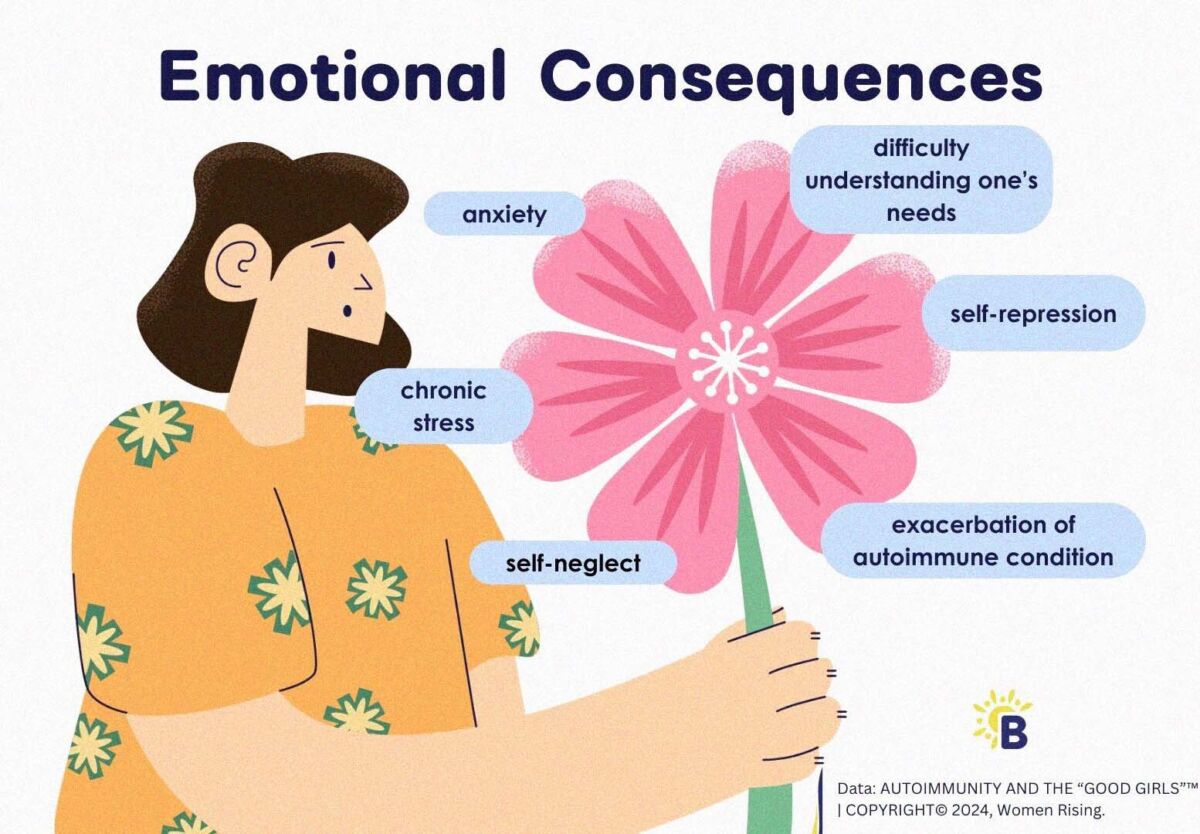
The long-term health implications of this self-neglect are severe. As the survey indicates, many women with autoimmune diseases internalize the belief that they must be “good” to be loved, leading to chronic stress and a weakened immune system. This cycle of emotional repression and self-sacrifice can significantly impact their overall well-being and quality of life.
Moving Forward – Empowerment and Change
Breaking the cycle of self-neglect and prioritizing one’s health and well-being is not something that happens overnight. It’s a gradual process, but every small step counts:
- Self-Awareness: Recognize and acknowledge the patterns of self-sacrifice and people-pleasing. This awareness is the first step toward change.
- Set Boundaries: Learn to say “no” and establish boundaries that protect your time and energy. It might be uncomfortable at first, but it’s essential for your well-being.
- Seek Support: Reach out to friends, family, or support groups who understand and respect your need for self-care. Remember, you’re not alone in this journey.
- Practice Self-Care: Regularly engage in activities that nourish your mind, body, and spirit, such as exercise, meditation, and hobbies. Start small; even a few minutes a day can make a difference.
- Professional Help: Consider therapy or counseling to address deep-seated issues and develop healthier coping strategies. It’s okay to ask for help; it’s a sign of strength, not weakness.
Re-Educating and Re-Parenting
Re-educating oneself about the importance of self-care and using re-parenting techniques can help change ingrained habits. It’s a continuous journey, but each step forward is progress:
- Educate Yourself: Read books, attend workshops, or join online communities focused on self-care and empowerment. Knowledge is power, and understanding these concepts can provide a solid foundation for change.
- Re-Parenting Techniques:
- Affirmations: Use positive affirmations to reinforce your worth and the importance of your needs. Phrases like “I am worthy of care” can gradually shift your mindset.
- Inner Child Work: Connect with your inner child and provide the love and validation you may have missed in your upbringing. This can be healing and transformative.
- Self-Compassion: Practice self-compassion by treating yourself with the same kindness and understanding you would offer a friend. It’s okay to make mistakes and have setbacks; what matters is continuing to move forward.
- Small Steps: Start with small changes, such as taking a few minutes each day for yourself, and gradually build up to more significant shifts in behavior and mindset. Progress is still progress, no matter how slow.
It’s important to understand that these challenges can’t be resolved right away. The key is to take steps, however small, toward prioritizing your health and well-being.
By breaking the cycle and re-educating themselves, women can reclaim their health and well-being, creating a new narrative that prioritizes self-care and empowerment.
Video: Reparenting Yourself
Discover a practical and empowering framework for reparenting yourself. Understanding and mastering emotional validation, regulation, self-discipline, and self-care is crucial for breaking the cycle of self-neglect and prioritizing your well-being. This insightful video will guide you through each step, showing you how to start this transformative journey toward a healthier, more empowered you.
Final Thoughts
Childhood caregiving roles often lead to lifelong self-neglect and significant health issues, including autoimmune conditions.
Sara Bordo’s survey, conducted by PROOF Insights for Women Rising®, reveals the link between these early roles and the challenges women face in receiving help.
Highlighting how societal expectations and childhood caregiving responsibilities foster chronic stress and self-neglect, the survey underscores the need for change.
By gradually prioritizing self-care, women can reclaim their health and well-being.
Ready to dive deeper into this topic? Become a BrightlyThrive™ member for access to community support, daily Live sessions, expert Q&As, vetted autoimmune content, and the latest research, just like this premium resource from Sara Hirsh Bordo.
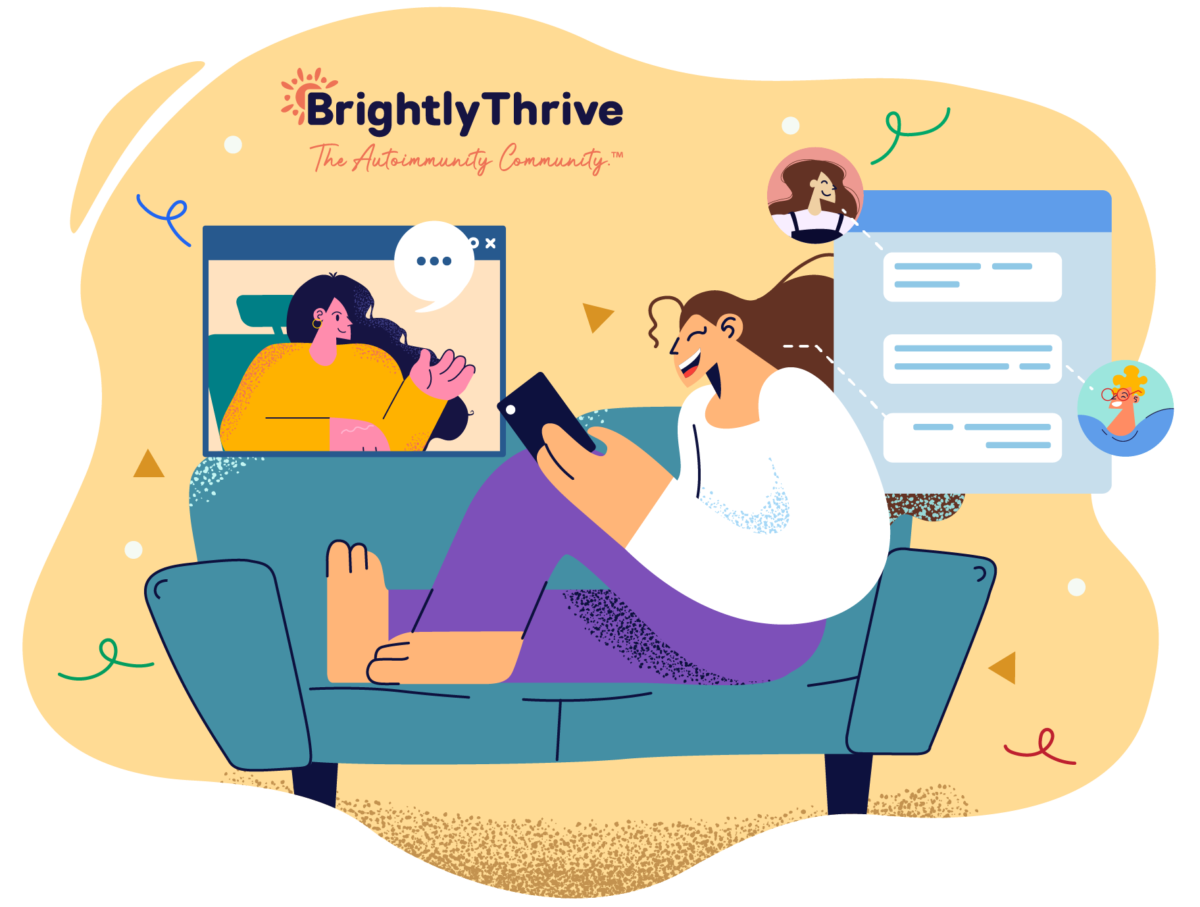
References
Bordo, S. H. (2024). Autoimmunity and the “Good Girls” (pp. 1-42). Women Rising®. Retrieved from https://autoimmunesurvey.com/store/p/full-report.
Van Nistelrooy, I. (2014). Self-sacrifice and self-affirmation within care-giving. Medicine, Health Care and Philosophy, 17(4), 519–528. https://doi.org/10.1007/s11019-013-9523-z
Sharma, N., Chakrabarti, S., & Grover, S. (2016). Gender differences in caregiving among family – caregivers of people with mental illnesses. World Journal of Psychiatry, 6(1), 7. https://doi.org/10.5498/wjp.v6.i1.7
Eyal, M. (2023, October 3). Self-Silencing Is Making Women Sick. TIME. https://time.com/6319549/silencing-women-sick-essay/
Britton, L. E., Kaur, G., Zork, N., Marshall, C. J., & George, M. (2023). ‘We tend to prioritise others and forget ourselves’: How women’s caregiving responsibilities can facilitate or impede diabetes self‐management. Diabetic Medicine, 40(3). https://doi.org/10.1111/dme.15030
Stanford Medicine-led study shows why women are at greater risk of autoimmune disease. (2024, February 1). News Center. https://med.stanford.edu/news/all-news/2024/02/women-autoimmune.html
TAGS:
CATEGORIES:






